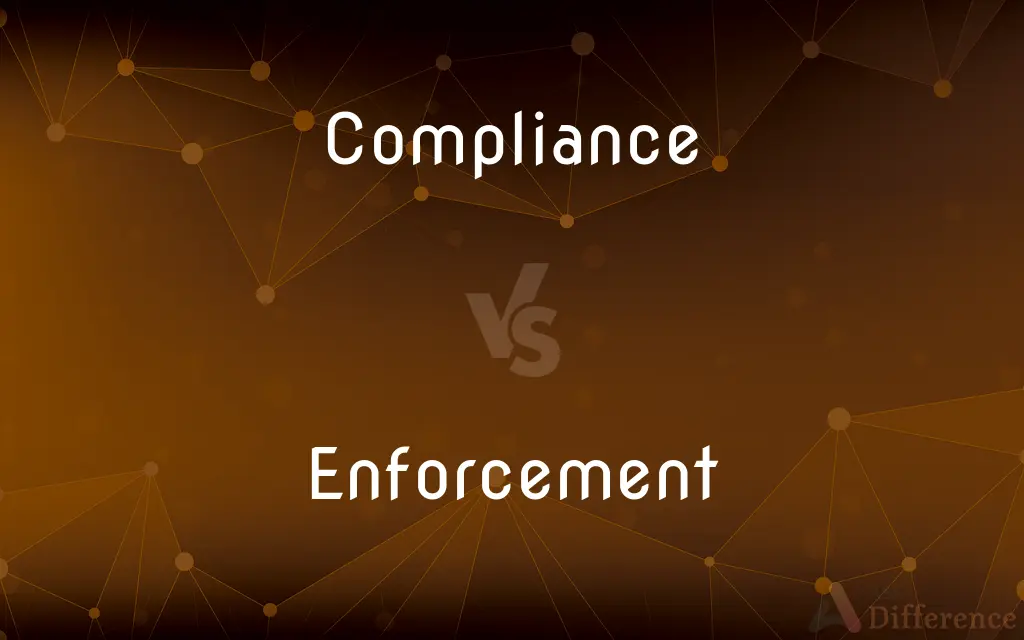Compliance vs. Enforcement — What's the Difference?
By Fiza Rafique & Maham Liaqat — Updated on April 2, 2024
Compliance involves adhering to rules or standards, while enforcement is the act of compelling observance of these rules through regulatory mechanisms.

Difference Between Compliance and Enforcement
Table of Contents
ADVERTISEMENT
Key Differences
Compliance refers to the process of following and meeting the requirements set by laws, regulations, or guidelines. It is a proactive measure taken by organizations or individuals to ensure they are in line with legal and ethical standards. On the other hand, enforcement involves the mechanisms or actions taken by authoritative bodies to ensure that the laws and regulations are observed. It often includes monitoring, inspections, penalties, and other measures to compel adherence.
While compliance is driven by the desire to maintain integrity and avoid legal repercussions, enforcement serves as the backbone that upholds the regulatory framework, intervening when compliance is not voluntarily achieved. Compliance is often seen as a self-regulatory approach, where entities take it upon themselves to follow the rules, whereas enforcement steps in when such self-regulation fails or is deemed insufficient.
In terms of responsibility, compliance is usually the duty of the entities subject to the regulations, such as businesses or individuals. They must stay informed and adjust their practices accordingly. Enforcement, however, is the responsibility of regulatory bodies or government agencies tasked with ensuring that the regulations are followed.
Compliance efforts can be seen in the implementation of internal policies, training programs, and audits to ensure adherence to laws and standards. Enforcement actions, however, manifest in legal proceedings, fines, sanctions, or other corrective measures imposed by regulatory authorities.
The relationship between compliance and enforcement is symbiotic. Effective enforcement promotes a culture of compliance, and high levels of compliance reduce the need for enforcement actions. Both are essential for the functioning of a regulatory system, ensuring that standards are met and maintained.
ADVERTISEMENT
Comparison Chart
Definition
The act of adhering to laws, regulations, or standards.
The act of ensuring observance of laws through regulatory mechanisms.
Driven by
Desire to maintain integrity and avoid legal repercussions.
Need to uphold the regulatory framework.
Responsibility
Entities subject to regulations (businesses, individuals).
Regulatory bodies or government agencies.
Approach
Self-regulatory, proactive.
Reactive, involves monitoring and penalties.
Manifestation
Internal policies, training, audits.
Legal proceedings, fines, sanctions.
Compare with Definitions
Compliance
The state of being in accordance with guidelines.
Their compliance was confirmed through an external audit.
Enforcement
Act of ensuring rules are followed.
Enforcement of parking regulations became more stringent.
Compliance
Adherence to laws and regulations.
The company's compliance with environmental laws saved it from fines.
Enforcement
Imposing penalties for rule violations.
The agency's enforcement actions included heavy fines.
Compliance
Conformity in actions or behavior.
Compliance with the new safety standards required significant changes.
Enforcement
Upholding the law through regulatory actions.
The government's enforcement of environmental laws has intensified.
Compliance
Meeting specified standards.
The facility achieved compliance with international quality standards.
Enforcement
Legal measures to compel obedience.
Enforcement of the new law began immediately after its passage.
Compliance
Following prescribed practices.
Compliance with data protection laws is crucial for customer trust.
Enforcement
The process of implementing authority.
The enforcement of safety measures prevented accidents.
Compliance
The action or fact of complying with a wish or command
The ways in which the state maintains order and compliance
Enforcement
Enforcement is the proper execution of the process of ensuring compliance with laws, regulations, rules, standards, and social norms.Governments attempt to effectuate successful implementation of policies by enforcing laws and regulations. Enactment refers to application of a law or regulation, or carrying out of an executive or judicial order.
Compliance
The property of a material of undergoing elastic deformation or (of a gas) change in volume when subjected to an applied force. It is equal to the reciprocal of stiffness.
Enforcement
To compel observance of or obedience to
Enforce a law.
Compliance
The act of complying with a wish, request, or demand; acquiescence.
Enforcement
To impose (a kind of behavior, for example)
Enforce military discipline.
Compliance
(Medicine) Willingness to follow a prescribed course of treatment.
Enforcement
To give force to; reinforce
"enforces its plea with a description of the pains of hell" (Albert C. Baugh).
Compliance
A disposition or tendency to yield to the will of others.
Enforcement
The act of enforcing; compulsion.
Compliance
Extension or displacement of a loaded structure per unit load.
Enforcement
A giving force to; a putting in execution.
Compliance
Flexibility.
Enforcement
That which enforces, constraints, gives force, authority, or effect to; constraint; force applied.
Compliance
An act of complying.
Enforcement
The act of enforcing; compulsion.
He that contendeth against these enforcements may easily master or resist them.
Confess 't was hers, and by what rough enforcementYou got it from her.
Compliance
(uncountable) The state of being compliant.
Enforcement
A giving force to; a putting in execution.
Enforcement of strict military discipline.
Compliance
(uncountable) The tendency of conforming with or agreeing to the wishes of others.
Enforcement
That which enforces, constraints, gives force, authority, or effect to; constraint; force applied.
The rewards and punishment of another life, which the Almighty has established as the enforcements of his law.
Compliance
(mechanics) A measure of the extension or displacement of a loaded structure; its flexibility
Enforcement
The act of enforcing; insuring observance of or obedience to
Compliance
(medicine) The accuracy with which a patient follows an agreed treatment plan
Compliance
The department of a business that ensures all government regulations are complied with.
Compliance
The act of complying; a yielding; as to a desire, demand, or proposal; concession; submission.
What compliances will remove dissension?
Ready compliance with the wishes of his people.
Compliance
A disposition to yield to others; complaisance.
A man of few words and of great compliance.
Compliance
Acting according to certain accepted standards
Compliance
Happy friendly agreement
Compliance
A disposition or tendency to yield to the will of others
Compliance
The act of submitting; usually surrendering power to another
Common Curiosities
How do compliance and enforcement work together?
Compliance ensures entities follow rules voluntarily, while enforcement compels observance through regulatory mechanisms.
Who is responsible for compliance?
The entities subject to regulations, such as businesses or individuals, are responsible for compliance.
Can there be compliance without enforcement?
Theoretically, yes, if entities voluntarily adhere to all rules, but enforcement ensures adherence when voluntary compliance fails.
Do all industries have the same compliance and enforcement standards?
No, standards vary widely across industries based on the nature of their operations and risks involved.
What forms can enforcement take?
Enforcement can include fines, sanctions, legal proceedings, and other corrective measures.
What is compliance?
Compliance is the act of adhering to laws, regulations, or standards set by authorities.
What does enforcement mean?
Enforcement refers to the actions taken by authoritative bodies to ensure rules and regulations are followed.
Why is compliance important?
Compliance is crucial for maintaining integrity, avoiding legal penalties, and ensuring ethical practices.
Is enforcement always punitive?
Primarily, yes, as it aims to penalize non-compliance, but it can also focus on correcting and preventing future violations.
Who carries out enforcement?
Regulatory bodies or government agencies are tasked with enforcement.
How can organizations ensure compliance?
Through implementing internal policies, conducting training, and regular audits to check for adherence.
How does enforcement affect business operations?
It can lead to changes in operations to avoid penalties and ensure adherence to regulations.
What is the ultimate goal of compliance and enforcement?
To ensure that legal and ethical standards are met, maintaining the integrity of business operations and protecting public interests.
What role does enforcement play in regulatory systems?
Enforcement ensures the integrity of the regulatory system by compelling adherence to its rules.
Can compliance be seen as a cost?
Yes, ensuring compliance can incur costs, but these are often seen as necessary for legal and ethical operations.
Share Your Discovery

Previous Comparison
Postering vs. Fostering
Next Comparison
Continuous vs. FartlekAuthor Spotlight
Written by
Fiza RafiqueFiza Rafique is a skilled content writer at AskDifference.com, where she meticulously refines and enhances written pieces. Drawing from her vast editorial expertise, Fiza ensures clarity, accuracy, and precision in every article. Passionate about language, she continually seeks to elevate the quality of content for readers worldwide.
Co-written by
Maham Liaqat














































